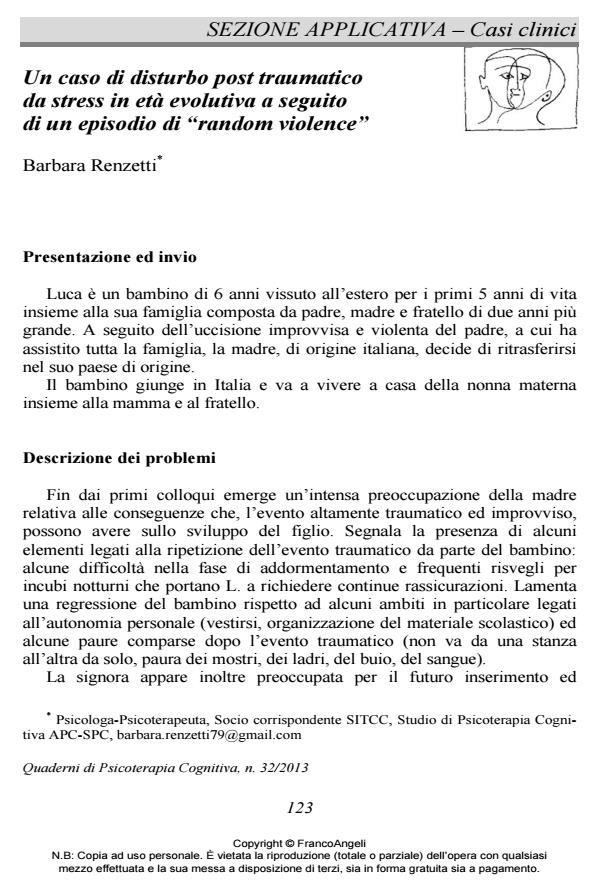A case of post traumatic stress disorder in children following an episode of "random violence"
Journal title QUADERNI DI PSICOTERAPIA COGNITIVA
Author/s Barbara Renzetti
Publishing Year 2013 Issue 2013/32
Language Italian Pages 15 P. 123-137 File size 426 KB
DOI 10.3280/QPC2013-032009
DOI is like a bar code for intellectual property: to have more infomation
click here
Below, you can see the article first page
If you want to buy this article in PDF format, you can do it, following the instructions to buy download credits

FrancoAngeli is member of Publishers International Linking Association, Inc (PILA), a not-for-profit association which run the CrossRef service enabling links to and from online scholarly content.
The loss of a parent always leaves an emptiness which implies the need to "reassess" his own story reorganizing it in the present. Much more difficult to accept, however, is the loss of a parent early in life, and this is felt to be horrible, unthinkable. Moreover, in general, when a child loses a parent, death is linked to violence, accidents, disasters, unfortunate outcome of a disease. Children are exposed to the suffering of their parents (victim and survivor), to live a feeling of extreme helplessness and to experience the loss of that person who normally provided the support needed to manage their fear reactions. The case presented is the story of Luca, 6 years, witnessed an episode of "random violence" acted against his primary attachment figure, in that circumstance loses his life. This episode helped to disrupt the attachment strategies of Luca. Were detected also signs of discomfort psycho, indicating a post traumatic stress syndrome (repetitive and intrusive recollection of the traumatic event, hypervigilance, exaggerated response of alarm, fear, dissociative states) that are accompanied by some signs of social maladjustment and depression. With reference to the model of Developmental Psycopathology, analyzed the factors of vulnerability and protection that can influence the developmental trajectory of the child, we have developed a treatment plan that provides for the intervention to individual weekly with Luca, interviews with the surviving parent and meetings with the school.
Keywords: Post traumatic stress disorder (PTSD), depression, bereavement, trauma, dissociation, emotional regulation
Barbara Renzetti, Un caso di disturbo post traumatico da stress in età evolutiva a seguito di un episodio di "random violence" in "QUADERNI DI PSICOTERAPIA COGNITIVA" 32/2013, pp 123-137, DOI: 10.3280/QPC2013-032009